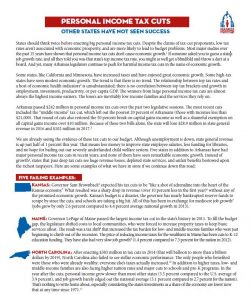
States should think twice before enacting big personal income tax cuts. Despite the claims of tax-cut proponents, low tax rates aren’t associated with economic prosperity, and are more likely to lead to budget problems. Most major studies over the past 15 years have shown that personal income tax cuts don’t cause economic growth. If someone asked you to guess a state’s job growth rate, and all they told you was that state’s top income tax rate, you might as well get a blindfold and throw a dart at a board. And yet, many Arkansas legislators continue to push for harmful income tax cuts in the name of economic growth.
Arkansas passed $242 million in personal income tax cuts over the past two legislative sessions. The most recent cuts included the “middle income” tax cut, which left out the poorest 20 percent of Arkansans (those with incomes less than $21,000). That round of cuts also restored the 50 percent break on capital gains income as well as a shameful exemption on all capital gains income over $10 million. Because of these two bills alone, the state will lose $28.9 million in state general revenue in 2016 and $102 million in 2017.
We are already seeing the evidence of these tax cuts to our budget. Although unemployment is down, state general revenue is up just half of 1 percent this year. That means less money to improve state employee salaries, less funding for libraries, and no hope for bailing out our severely underfunded child welfare system. Five states in addition to Arkansas have had major personal income tax cuts in recent years, and none of them have seen remarkable economic growth. Instead of growth, states that pass deep tax cuts see huge revenue losses, depleted state services, and unfair benefits bestowed upon the richest taxpayers.
In the first in a four-part series, learn more about how substantial personal income tax cuts have harmed other states, and how they will continue to harm Arkansas if we don’t enact better policies.
